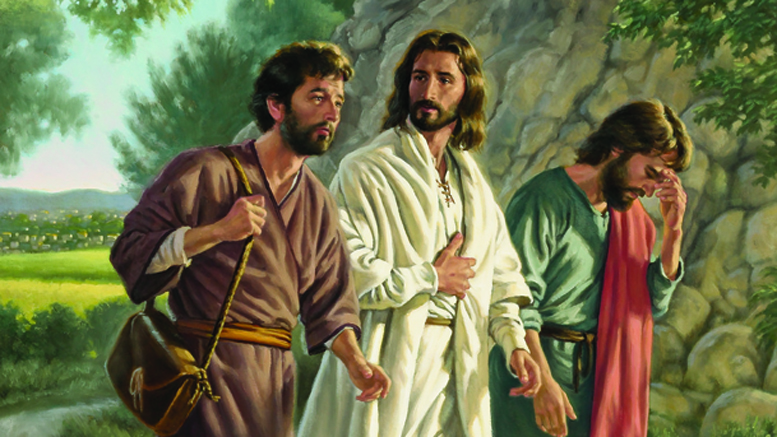Third Sunday of Easter: The Walk of Grief
Many of us have been on that road of grief. Our lives had been going well. We were happy. Perhaps, not giddy, but content. We had our plans all set and everything seemed to be fitting into place. Then something unforeseen happened, something tragic, or at least, challenging
Apr 24, 2020

3rd Sunday of Easter Readings:
Acts of the Apostle 2:14, 22-23;
1 Peter 1:17-21; Gospel: Luke 24:13-35
Two men were taking a long walk of shock, disappointment and grief. They were walking from Jerusalem to their home in Emmaus. It was a long walk. Emmaus was about seven miles from Jerusalem, about a four-hour walk. It was a long walk. It was a sad walk. The men had been disciples of Jesus of Nazareth. They had heard His message. They had heard Him speak about the love of the Father. He had said that they should pray to God addressing Him as a baby addresses his or her Father, Abba. They had heard Him speak about the love we need to extend to others. Life would be so beautiful; the world would be so wonderful if people would only love each other, especially those who need the love and compassion of others. The disciples had witnessed His deeds. Perhaps they had been present when he raised up from the dead the son of the widow of Nain, or little Tabitha, or Lazarus. Perhaps they had seen some of his healings. Certainly, they had been present when he multiplied the bread and fish for thousands. They were sure that Jesus was the Messiah.
But then everything fell to pieces. Jesus was arrested the Thursday before. He was treated horribly that night and then on the next day, scourged and crucified. The disciples were certain that this could not happen to the Messiah. They were in shock. They were dis appointed. And they were in grief. They had loved this Jesus, and now He was gone. That day, Sunday, there had been a story that Jesus was not in the tomb. But that sounded too farfetched probably more wish than reality.
Many of us have been on that road of grief. Our lives had been going well. We were happy. Perhaps, not giddy, but content. We had our plans all set and everything seemed to be fitting into place. Then something unforeseen happened, something tragic, or at least, challenging. During this last year, two young fathers in our parish died suddenly. Not only did their lives end sooner than expected, but now their wives and children had to adapt to a new reality in the middle of their struggling with grief. Other people, young people, have come down with life threatening diseases and conditions like cancer or heart problems. Everything changes for them and their families.
When tragedy strikes, it is quite normal for us to ask many questions. The main questions we ask are “Why? Why did this happen?” and “Where were you? Where were you God?”
When the disciples on the road asked the Why question, they were taught that the answer to their question could be found in Scripture. The stranger that joined them on the walk told them about the Suffering Servant of Isaiah and then how the prophecies were fulfilled in Jesus suffering, death and resur rection.
When we ask the Why question, we also need to listen to what the Word of God is saying to us. Scripture tells us that there is infinitely more to life than the here and now. It tells us that we are made for eternity. It tells us that our loved ones have transitioned from this life to the next because physical life ends but the spiritual life remains. Scripture tells us that God can, and does, write straight with the crooked lines of our lives. We need to be exposed to the Word of God to deal with our lives. We need to read the Bible. We need to come to church and hear how the passages of the Bible relate to our lives. “We’re not our hearts burning when He explained the Scripture to us?,” the disciples said. Our hearts will also burn when we realise that everything that happens in our lives can, and will, be used by God as part of His plan.
That is the best answer we can come upon for the Why question. Then there is the Where question. Where were you God when this happened? God answers, “I was right there with you.” He is here with us now, rejoicing with us in the good times and crying with us in the stressful times. God is not remote, removed from us. The direct opposite. He is so close to us that He wants us to take His Body and Blood inside of us. We do this every time we receive communion. Then we come even closer to Him.
Those disciples recognised the presence of God in the breaking of the bread. We call on our faith and recognise the presence of God in the Eucharist. We need to receive communion so we can cherish the very presence of God within us. We need to call out to Him for help. We need to ask Him to help us hold on, hold on to our being our best selves, to hold on to our faith.
We have all been there, with those disciples on that road. We will probably be there again. But we will never walk alone. Jesus is there walking with us, calming us, soothing us with His Word and strengthening us with His Eucharist.
Our lives are a journey with the Lord on the road to Emmaus.-- By Msgr Joseph A Pellegrino







Total Comments:0